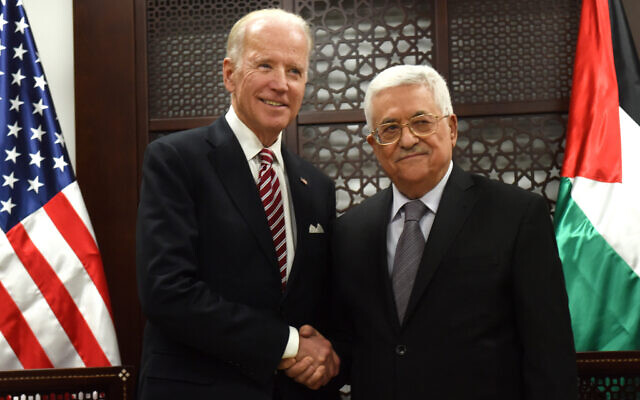The Biden administration intends to overturn another Trump-era policy by opening Palestinian diplomatic missions and reinstating aid to Palestinians; however, U.S. law prohibits economic assistance to the Palestinian Authority until it ends its terrorist sponsorship and misuse of the International Criminal Court (ICC) against Israel.
“The Biden administration won’t be able to ignore U.S. law. There’s a reason assistance to the Palestinian Authority is suspended: the Taylor Force Act prohibits such assistance until the Palestinians stop paying terrorists and their families. There’s a reason the PLO office is closed: U.S. law says it must be closed if the Palestinians engage in lawfare against Israel at the [ICC],” said Senior Advisor at the Foundation for Defense of Democracies (FDD) Richard Goldberg to The Foreign Desk.
 US Vice President Joe Biden, left, and Palestinian President Mahmoud Abbas, shake hands for the press at the presidential compound in Ramallah, West Bank, Wednesday, March 9, 2016. (Debbie Hill, Pool via AP)
US Vice President Joe Biden, left, and Palestinian President Mahmoud Abbas, shake hands for the press at the presidential compound in Ramallah, West Bank, Wednesday, March 9, 2016. (Debbie Hill, Pool via AP)
U.S. Ambassador to the UN Richard Mills spoke to the UN Security Council Tuesday and emphasized Biden’s commitment “to restore U.S. assistance programs that support economic development programs and humanitarian aid for the Palestinian people and to take steps to re-open diplomatic missions that were closed by the last U.S. administration” in the face of U.S. law.
“We have a new president – but the laws on these issues have not changed. Should the Palestinian leadership make a strategic decision to change course, which they have not yet done, that would be a welcome step but, so far, it seems these steps are premature,” said Goldberg.
In 2018, the Trump administration cut off $200 million in aid to Palestinians citing “U.S. national interests” and in light of Hamas’ control of the Palestinian Authority (PA) in the Gaza Strip.
Hamas, an Islamic terrorist group heavily funded by Iran, is the main political party vying for power in the West Bank and Gaza Strip, primarily against the secular Fatah party.
While Mills emphasizes that the funding is not intended to benefit the Palestinian government but the Palestinian people, funding will not resolve the political rift within the Palestinian Authority (PA) that is greatly contributing to its populations’ humanitarian crisis.
The Hamas-controlled PA is continually applying “punitive measures on the population of Gaza by cutting civil service salaries and forcing early retirement. The authorities in Gaza [continue] to arbitrarily arrest and detain Fatah affiliates [Hamas’ political opposition] and others; numerous reports were made of ill-treatment of detainees,” according to a 2020 UN report.
Biden’s policy towards the Israel-Palestinian conflict is to “support a mutually agreed, two-state solution, one in which Israel lives in peace and security, alongside a viable Palestinian state,” according to Mills.
“The United States will urge Israel’s government and the Palestinian Authority to avoid unilateral steps that make a two-state solution more difficult, such as annexation of territory, settlement activity, demolitions, incitement to violence and providing compensation for individuals imprisoned for acts of terrorism,” said Mills.
Mills stated that the Biden administration is relying on “the active consent” of Israel and Palestinians, despite the fact that this has been historically lacking since the Israeli state was established in 1948 and the first Arab-Israeli War began.








